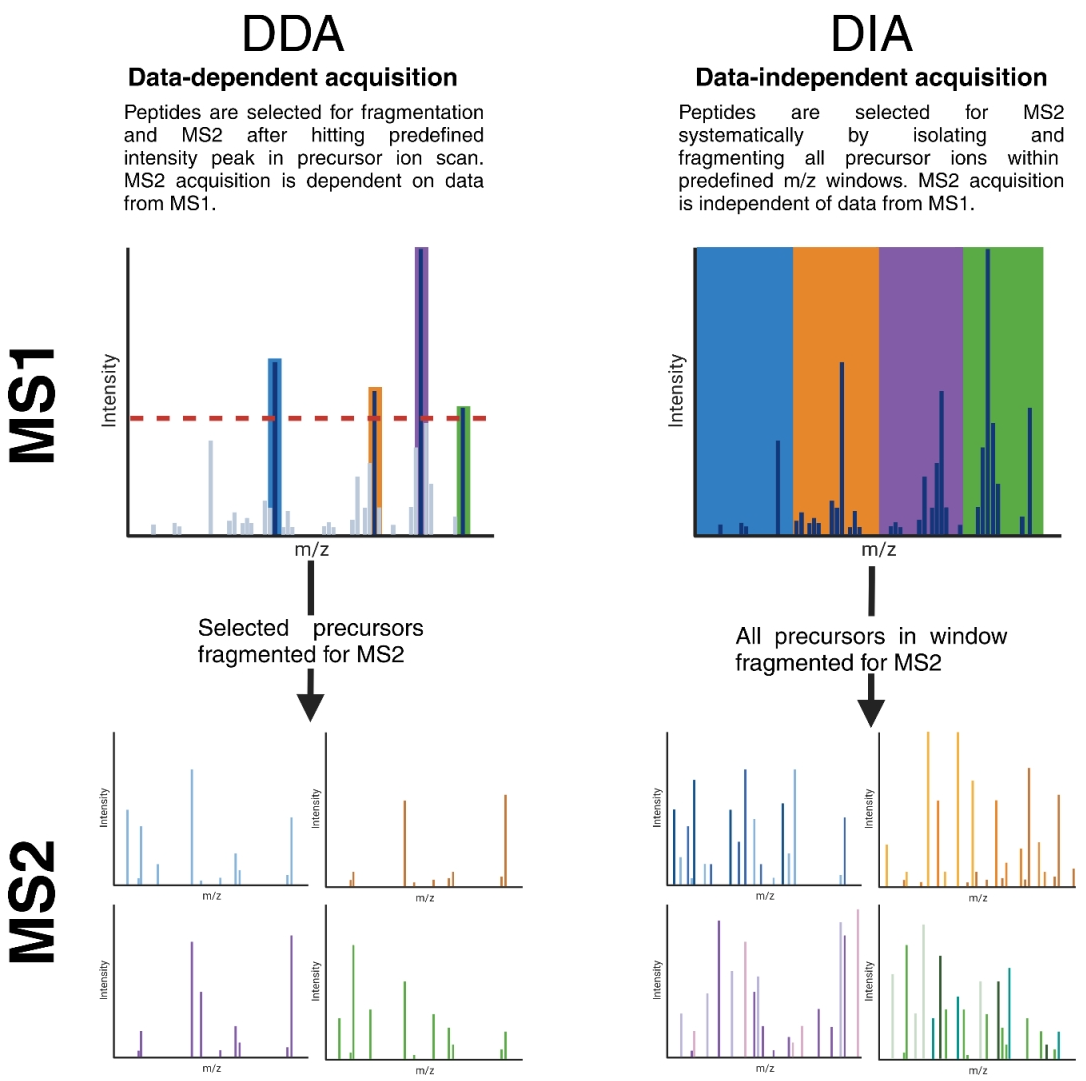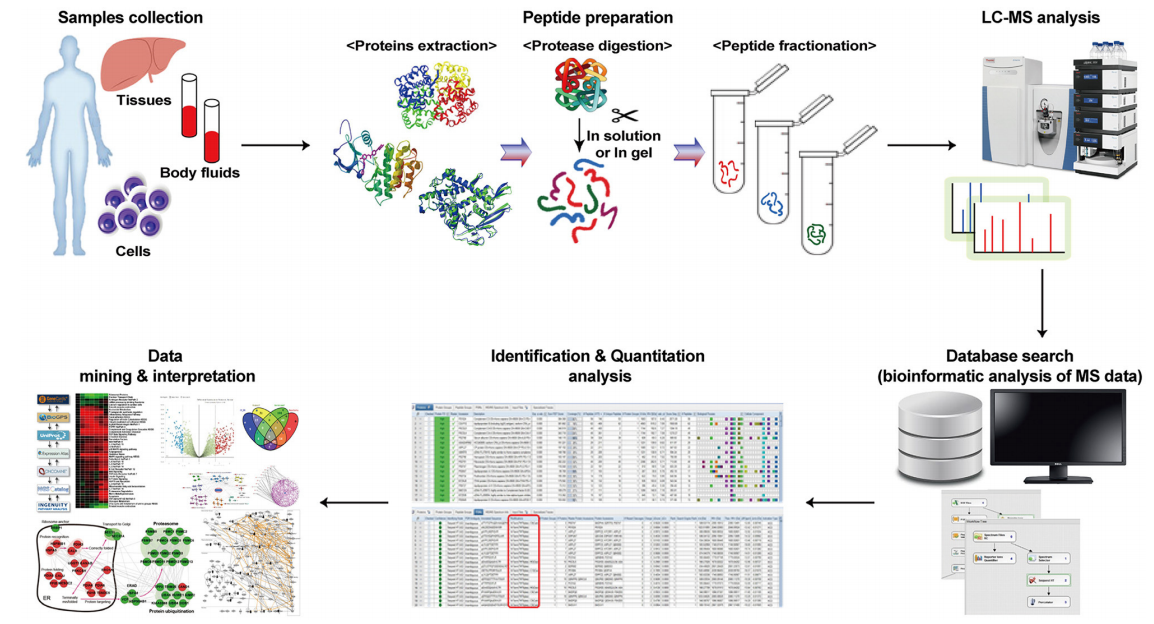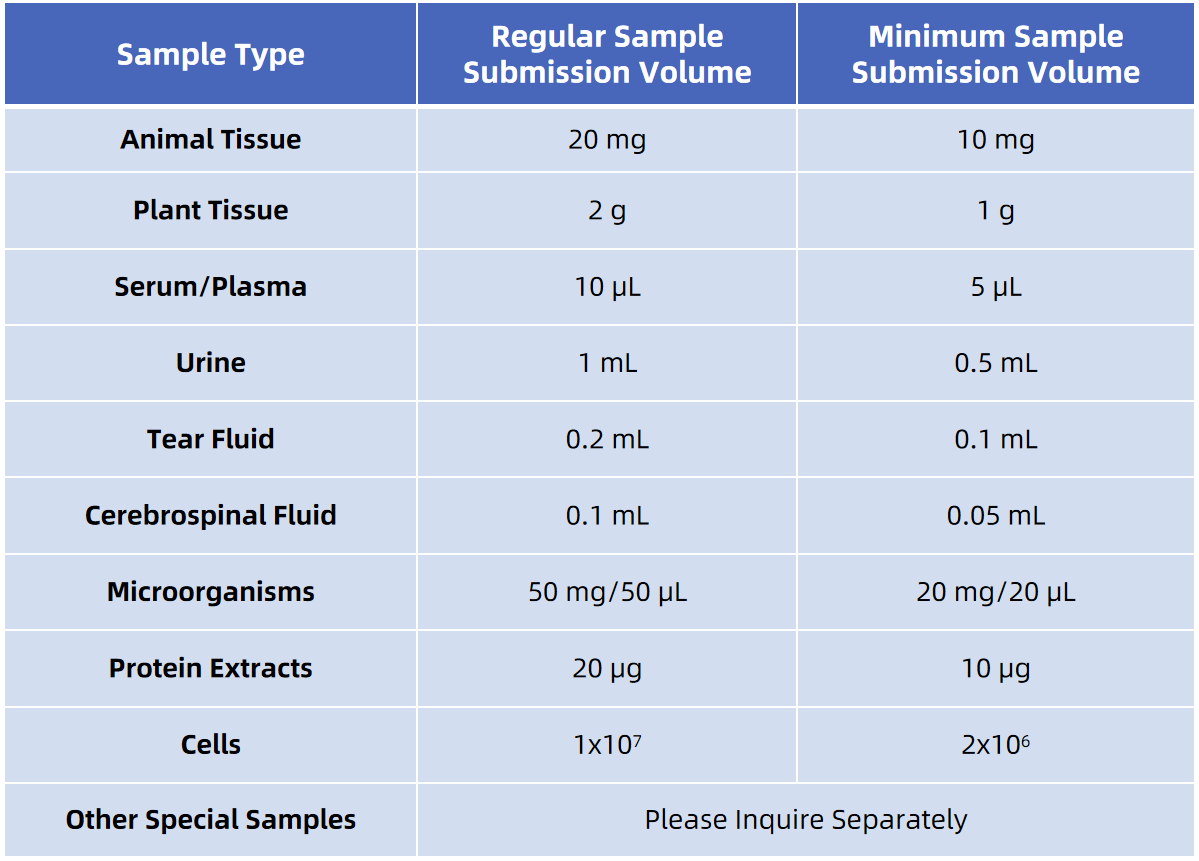Mass Spectrometry-Based Proteomics Service
- Quadrupole: Uses alternating electric fields for selective ion filtration, ideal for high-sensitivity targeted quantitative analysis.
- Time-of-Flight (TOF): Calculates m/z based on ion flight time, suitable for high-throughput large-scale scans.
- Orbitrap: Achieves ultra-high resolution and mass accuracy through electrostatic fields, widely used for deep analysis of complex samples.
- Data-Dependent Acquisition (DDA)
- Data-Independent Acquisition (DIA)
- Sample Preparation: Includes protein extraction, quantification, enzymatic digestion, and optional enrichment for specific modifications or low-abundance proteins.
- LC-MS/MS Analysis: Peptide separation through Nano-LC and detection via Orbitrap Fusion Lumos for precise mass and sequence data.
- Data Processing and Analysis: Software-based protein identification, quantification, and PTM annotation using tools like MaxQuant or Proteome Discoverer.
- Report Generation: Comprehensive reports including protein lists, quantitative results, functional annotations, and tailored research insights.
- Discovering disease biomarkers for diagnostic or prognostic purposes.
- Investigating protein roles and pathways in disease mechanisms.
- Understanding drug-protein interactions to inform drug development.
- Studying PTMs such as phosphorylation, acetylation, and glycosylation.
- Exploring protein expression under environmental or agricultural stress conditions.
Proteomics is a vital field that investigates protein composition, functions, and dynamic changes, offering indispensable insights into biological processes. With advancements in mass spectrometry technology, mass spectrometry-based proteomics has become an essential tool for analyzing protein composition, quantitative distribution, and post-translational modifications (PTMs) in complex samples. This approach is widely applied in areas such as disease mechanism research, biomarker discovery, and drug development.
MtoZ Biolabs provides comprehensive mass spectrometry-based proteomics service from sample preparation to data interpretation, leveraging the Thermo Fisher Orbitrap Fusion Lumos mass spectrometer and Nano-LC system. Supported by advanced platforms and expert teams, our services deliver precise and reliable results, empowering researchers to achieve breakthroughs in life sciences.
Technical Principles
Mass spectrometry-based proteomics involves precise sample preparation and efficient data acquisition, encompassing three essential stages: ionization, ion separation, and data analysis.
1. Ionization
The ionization process transforms sample molecules into charged ions using methods such as electrospray ionization (ESI) or matrix-assisted laser desorption/ionization (MALDI). ESI is well-suited for liquid samples and pairs effectively with liquid chromatography to facilitate peptide separation. MALDI is recognized for its speed and efficiency, particularly in analyzing large biomolecules. Both techniques preserve molecular integrity, ensuring downstream analyses are accurate and reproducible.
2. Ion Separation
Once ionized, samples are introduced into a mass analyzer to be separated based on their mass-to-charge ratio (m/z):
3. Data Acquisition Modes
Data acquisition is the core process of mass spectrometry-based proteomics. MtoZ Biolabs provides two main modes to meet different research needs:
DDA selects the most intense precursor ions for fragmentation and generates high-quality fragment spectra. It is suitable for deep identification of unknown proteins. Combined with strategies like SRM or PRM, DDA enables highly sensitive targeted quantitative analysis. However, DDA's coverage for low-abundance proteins is limited, and there may be a risk of missing information in complex samples.
DIA collects all precursor ions within a predefined mass range, ensuring data consistency and comprehensiveness without relying on signal intensity. SWATH, a classic DIA implementation, performs segmented scanning of the mass range to generate comprehensive fragment information, making it particularly suitable for quantitative studies of complex samples and low-abundance proteins. Although DIA data processing is more complex, it excels in large-scale proteomics research.
By combining the advantages of DDA and DIA, MtoZ Biolabs designs flexible experimental protocols to achieve the best balance between deep identification and broad coverage, providing comprehensive and accurate mass spectrometry-based proteomics solutions for researchers.

Ward, B. et al. BioRxiv, 2024.
Figure 1. Difference Between DDA and DIA
Analysis Workflow
Our mass spectrometry-based proteomics service offers a streamlined and systematic approach to protein analysis, ensuring high-quality data for diverse research needs. Below is an overview of our analysis process:

Kwon, YW, et al. Front Med (Lausanne). 2021.
Figure 2. The Workflow of Proteomics Analysis
Sample Submission Suggestions

Why Choose MtoZ Biolabs?
1. Advanced Analysis Platform: MtoZ Biolabs established an advanced mass spectrometry-based proteomics platform, guaranteeing reliable, fast, and highly accurate analysis service.
2. One-Time-Charge: Our pricing is transparent, no hidden fees or additional costs.
3. High-Data-Quality: Deep data coverage with strict data quality control. AI-powered bioinformatics platform integrate all proteomics data, providing clients with a comprehensive data report.
4. Multi-Sample Compatibility: Our platform supports a wide variety of biological samples, including cells, tissues, blood, and bodily fluids, providing flexibility to accommodate diverse research demands.
5. Customized Service: Tailored to the specific research needs of our clients, we offer flexible experimental design and personalized data analysis to ensure the achievement of research goals to the fullest extent.
Applications
The mass spectrometry-based proteomics service empowers researchers with advanced tools for protein profiling and functional analysis, supporting a wide range of applications in clinical, pharmaceutical, and environmental studies. Key applications include:
Deliverables
1. Comprehensive Experimental Details
2. Materials, Instruments, and Methods
3. Total Ion Chromatogram & Quality Control Assessment
4. Data Analysis, Preprocessing, and Estimation
5. Bioinformatics Analysis
6. Raw Data Files
MtoZ Biolabs, an integrated Chromatography and Mass Spectrometry (MS) Services Provider, provides advanced proteomics, metabolomics, and biopharmaceutical analysis services to researchers in biochemistry, biotechnology, and biopharmaceutical fields. Our mass spectrometry-based proteomics service is designed to deliver rapid, high-throughput, and cost-effective analysis while ensuring exceptional data quality and minimal sample consumption. Free project evaluation, welcome to learn more details!
MtoZ Biolabs, an integrated chromatography and mass spectrometry (MS) services provider.
Related Services
Mass Spectrometry-Based Protein Identification Service
How to order?







